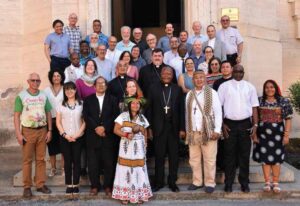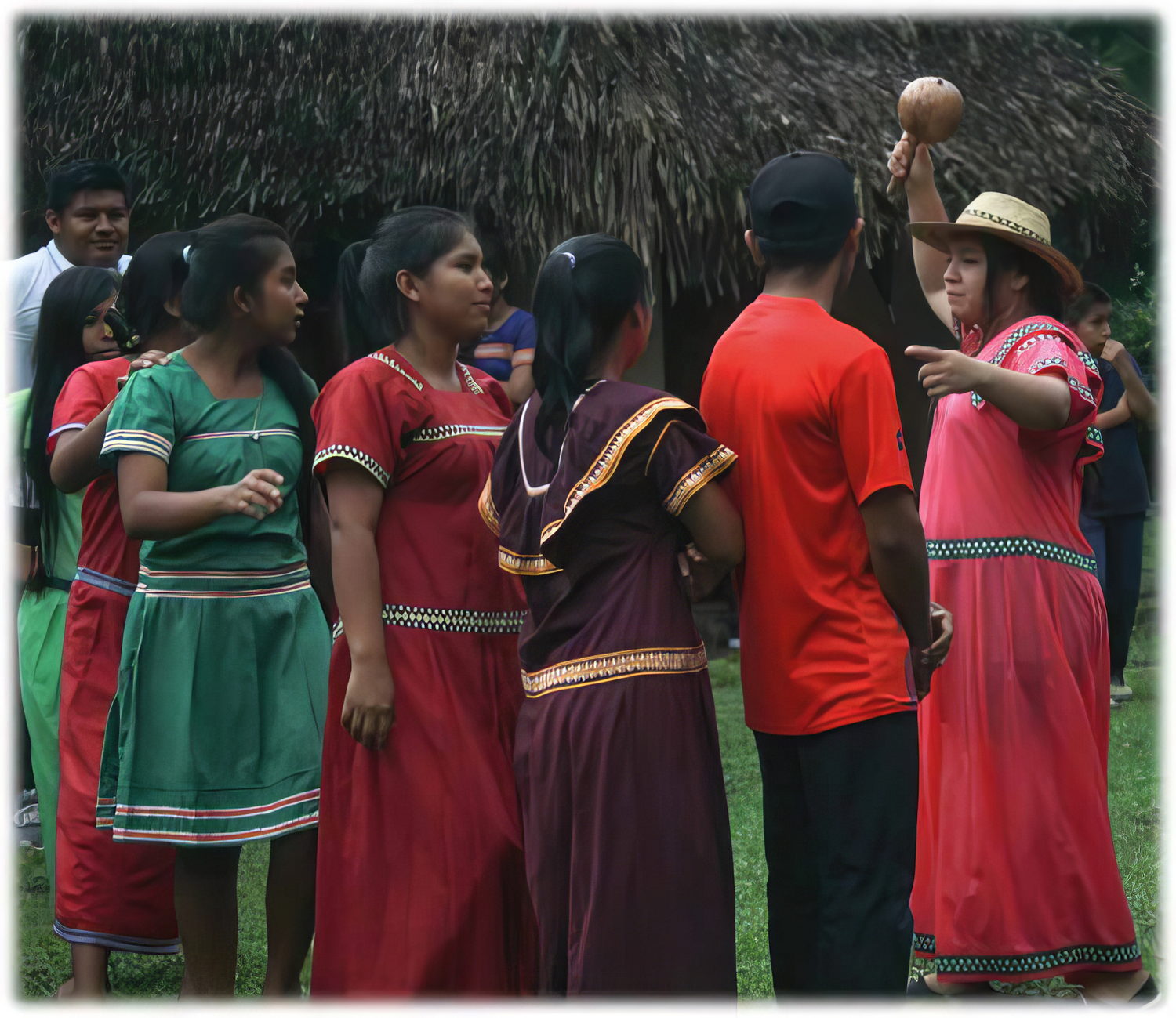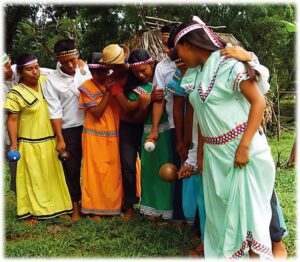In one of the ancestral myths that explain the cosmic order of the Ngäbe Indians of Panama, the lightning is a twin who ascended to heaven while his sister became a dragon and went to sea. When lightning strikes near a Ngäbe dwelling, tradition calls for the traditional “jeki” dance to be performed for four consecutive days. The dance involves all participants, connected arm in arm in long filas, following the steps guided by the maraca and sacred chants. The movements of the dance often abstractly mimic the movement of animals. In this case, the purpose of the dance is to “scold” the ray to let it know that it is not welcome near the place of family coexistence and that it would be better if it fell with its sister into the sea. The sacred dance serves to reestablish the cosmic order, where all beings have their place and function.
Ngäbe practices are not individual, but communal or collective. The Ngäbe, like other indigenous peoples, have maintained practices of reciprocity for millennia. They understand that every action has consequences and that it is their responsibility to understand their place and role in the Creator’s plan, which makes them active participants in the perpetual creation. In times of danger or threat, the community unites as one body, acting together to maintain the cosmic order. This collective nature of Ngäbe practices underscores the unity of the community and its impact on climate action.
In recent decades, the jeki dance has become commonplace in contexts of social protest, especially in resistance to government and corporate intentions to establish open-pit mineral extraction mines in the Ngäbe area and other territories of the country. The jeki dance, a symbol of the unity of the Ngäbe people, played a key role in the resistance of finals of 2023, a month-long road blockade that helped stop the largest open-pit mining development in the Mesoamerican Biological Corridor. By blocking the advance of this project, in union with hundreds of thousands of non-indigenous Panamanians, Panama remains for the moment one of only three countries worldwide that is carbon negative; that is, its forests sequester more carbon than the country emits, thus helping to combat the climate crisis.
Tackling the climate crisis together
When we consider indigenous peoples and what they have to teach us about integral ecology, one essential aspect is the communal identity that defines most of their cultures around the world. As the individualistic mentality becomes manifiested in consumer culture and a tunnel vision of progress and leads us to a fragile place of planetary destruction, the indigenous vision of “we” becomes an essential aspect of moving forward. As Pope Francis expresses in Dear Amazonia, for indigenous peoples, “Life is a communal journey where tasks and responsibilities are divided and shared for the common good. There is no place for the idea of an individual detached from the community or its territory” (20). Indigenous peoples express the authentic quality of life in “personal, family, community and cosmic harmony, which is expressed in their communitarian way of thinking about existence, in the ability to find joy and fulfillment in the midst of an austere and simple life, as well as in the responsible care of nature that preserves resources for the next generations” (71).
Ecological Church Networks
Recognizing the importance of collaborating and uniting in the face of the growing ecological crisis, ecological ecclesial networks have been forming around the world over the last decade. The best known of these is the Pan Amazonian Ecclesial Network REPAM, formed in 2014. Since its founding, indigenous voices and leadership have been a central aspect. Today, there are several other biome-based networks in various stages of organization-Mesoamerica, Congo Basin, Oceania-Asia, and Gran Charco-Guarani Aquifer. An alliance to informally promote collaboration among the networks has taken shape, and after a virtual process, the Ecclesial Networks Alliance ENA met at the Dicastery for the Promotion of Integral Human Development in Rome in July 2023. It was an opportunity to come to understand the particularity of what territorial networks offer, especially with their emphasis on traditionally marginalized voices such as the indigenous.
A specific topic addressed in Rome by the ENA was how to intercede as Church in the climate crisis at the international level, in contexts such as the UN Conference of the Parties on Climate Change (COP). As we have all surely experienced, the enormity and complexity of climate change can be overwhelming and even lead to paralysis, to a “we can’t do anything” mentality. However, climate action, as a manifestation of our faith and our commitment to care for God’s creation and the most vulnerable populations of our fragile planet, should be an integral part of our evangelization efforts.
Undoubtedly, individual and collective climate action play complementary roles in addressing the urgent challenge of the climate crisis. And while we must accept that facing the reality of the climate crisis is everyone’s responsibility, we must not confuse this afirmation with thinking that the sum of individual actions will solve this complex emergency. Personal lifestyle changes, such as reducing energy consumption, recycling, eating less meat and using public transport, set an example, influence norms and collectively change what is considered “normal.” However, these small symbolic actions must always be aligned with the demand for systemic change.
Pope Francis afirms in Laudato Deum that “we need to be sincere and recognize that the most effective solutions will come not only from individual efforts but first and foremost from major decisions in national and international politics” (69). Collective action includes participating in elections and voting for politicians who prioritize climate-responsible policies, doing research on candidates and referenda, especially at the state and local level, sharing credible climate-related information in our pastoral and institutional contexts and helping to shift public priorities to address climate change, keeping up to date on environmental policies and climate issues, discussing these issues with others to foster awareness and understanding.
Perhaps the most urgent context for impactful climate action is to pressure policy makers and power holders to respond immediately to the crisis with concrete new national, regional and international action. Advocacy for systemic change is vitally important and includes shifting policies, regulations and international agreements toward just models that reduce the impact of the climate disaster already well underway. Recognizing that the political systems in our various countries favor short-term economic benefit to gain voter support, it seems necessary to make tougher choices and even use “degrowth” language in the face of the gravity of the situation.
Grassroots organizations, such as indigenous and environmental organizations, like the Ngäbe of Panama, have given hope for what is possible when collective action takes the lead. “Demands that spring up from below all over the world, where fighters from the most diverse countries help and accompany each other, can end up putting pressure on the factors of power” (LD 38).
World events in our local context
Two important events will soon be held in our continental context: COP16 on biodiversity and COP30 on climate change. The 16th Conference of the Parties to the United Nations Convention on Biological Diversity, to be held in Cali, Colombia, in November 2024, revolves around several critical factors for the conservation and sustainable use of biodiversity. It focuses on protecting critical ecosystems, including forests, and halting the loss of biodiversity, a “silent crisis” that threatens our natural world and the species it harbors.
The 30th United Nations Conference of the Parties on Climate Change, to be held in Belém, Pará, Brazil, in November 2025, plays a crucial role in addressing global warming and promoting sustainable alternatives for our planet. Notably, COP30 will be the first to be held in an Amazonian city, highlighting the importance of biodiversity and climate action and the fundamental role of the Amazon in the fight against climate change and biodiversity conservation.
A path to follow as consecrated
The presence of these conferences on our continent can make us reflect on our level of commitment to confront the climate crisis and accompany the affected populations. We might ask: As members of institutes of consecrated life, do we consider the reality of the climate crisis a central factor in our daily decisions about pastoral approaches and institutional organization? Do we continually inform ourselves about the changing political and social landscape? Are we willing to take the risks inherent in proclaiming the Gospel of Creation in the face of the forces of greed and supposed “progress”? Have we accepted the synodal model demonstrated to us by indigenous peoples, afirming that collective action is the necessary way forward?
May we continue to listen to the indigenous voices within our congregations in the many pastoral contexts in which we find ourselves. May we let the Holy Spirit and the rhythm of indigenous communities guide us as we work collectively to repair the damage to our Common Home and learn more each day about what it means concretely to walk together.
José Fitzgerald, CM,
Priest of the Congregation of the Mission of St. Vincent de Paul. He holds a doctorate in theology from the Pontificia Bolivariana University and is the author of the book “Danzar en la casa de Ngöbö: Resiliencia de la Vida Plena Ngäbe frente al neoliberalismo” [Dancing in the House of Ngöbö: Resilience of the Ngäbe Full Life in the Face of Neoliberalism].
Source: Bulletin “Al ritmo del Espíritu”, nº 4 – May/June 2024, edited by the Latin American Confederation of Religious (CLAR).










0 Comments